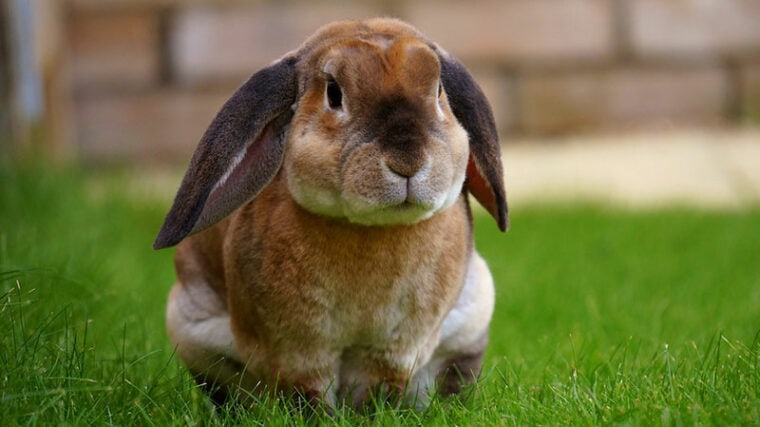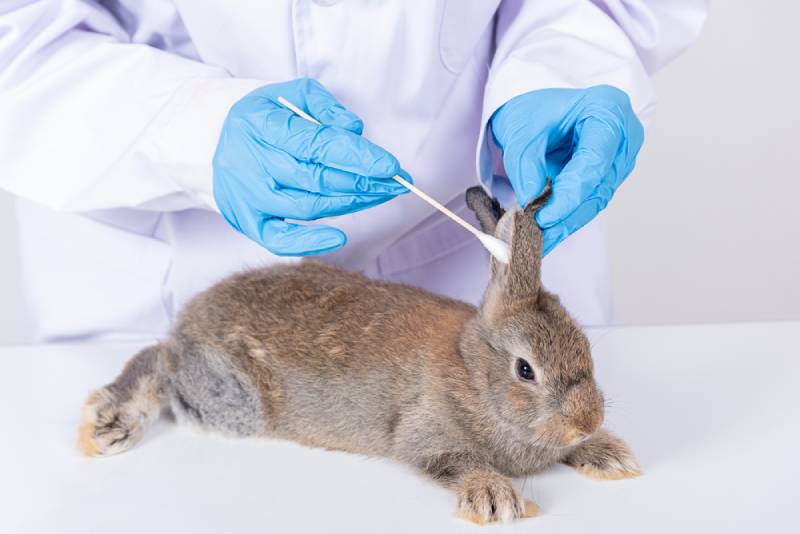
Click to Skip Ahead
As you can probably guess, the Plush Lop Rabbit got its name because of its soft, dense coat that resembles and feels like plush fabric. Plush Lop rabbits are available in miniature and standard sizes, and the miniature was first bred in 1995, while the standard came later in 2021.
Plush Lops were solely bred to be companion animals. They are docile and loving but can be quite adventurous as well, so they require a secure hutch they cannot escape. While they make great pets, Plush Lops might not be the right choice of pet for everyone.
Breed Overview
Size:
Miniature and standard
Weight:
2 to 5 pounds
Lifespan:
10 to 12 years
Similar Breeds:
Dwarf Lop, Netherland Dwarf, Standard Rex
Suitable for:
Families
Temperament:
Adventurous, docile, affectionate
The Plush Lop is an intelligent and social rabbit. You need to make sure that provide play sessions and toys for the rabbits to keep them busy because they can become bored if they aren’t stimulated properly. Exercise and playtime are essential for such a friendly rabbit; they become attached to their owners, unlike some breeds, and require daily attention.
In the guide below, we’ll give you everything you need to know about the Plush Lop Rabbit so you can determine if it’s the right choice of pet for you and your family.
Plush Lop Rabbit Breed Characteristics
How Much Do These Rabbits Cost?
You can expect to pay around $300 to $400 for the miniature Plush Lop rabbit. The standard Plush Lop rabbit will run you between $20 to $400. However, the price depends on your location and the breeder’s rates. There are exceptions, such as if the breeder is breeding rabbits for shows or the rabbit has a rare color of eyes, and you’ll end up paying more for your furry friend.
It’s important that you check into the breeder you choose to purchase your rabbit through thoroughly since some breeders are not reputable and don’t treat their animals the way they should.
It might be possible to pick up a Plush Lop rabbit at a rescue shelter, but it’s highly unlikely. You can also check pet stores to see if they have any.
Temperament & Intelligence of the Plush Lop Rabbit
Plush Lops are bred to be pets and are docile and quite friendly. They become attached to their pet parents, unlike many breeds that are anxious and scared of humans. Known for being less skittish than most rabbit breeds, the Plush Lop is easygoing and loves all the human attention it can get.
While the bunny is intelligent, they don’t learn tricks easily or obey commands. They can be trained to use a litter box and respond to their name, but they’re unlikely to perform simple tricks like other rabbits.
As with any animal, the rabbit’s personality must be considered when training. Some Plush Lops may be more accepting of your training sessions than others. Your best bet is to be patient and consistent and use positive reinforcement as praise when training your furry friend for the best results.
Do These Rabbits Make Good Pets? 👪
Yes, both the miniature and standard Plush Lop rabbits make excellent pets. The good thing about this breed is that they are good pets for expert and beginning rabbit owners. They’re playful and inquisitive, and you won’t have a problem getting them to play with you when you’re at home. However, they may not be suitable for owners who don’t have time to play with them every day. Like attention-seeking dogs and cats, Plush Lops must interact with humans to be mentally fit.
Does This Rabbit Get Along with Other Pets?
The Plush Lop Rabbit is known to get along well with dogs and cats. However, they can become antsy when they first meet a new animal. It’s best to introduce your rabbit to your other pets slowly. Remember, most cats and dogs will see a rabbit as prey and may try to chase your furry friend.
You can socialize and train your other pets and Plush Lop when you bring your bunny home. This rabbit also gets along well with other rabbit breeds, though you want to introduce them slowly as well. In fact, rabbit breeders recommend keeping two Plush Lop rabbits together to prevent loneliness and boredom.
Things to Know When Owning a Plush Lop Rabbit:
Now that you know more about purchasing a Plush Lop Rabbit, you need to know how to care for your new pet before buying one. We’ll discuss the care requirements that are important to know in the sections below.
Food & Diet Requirements 🥕
You can expect your Plush Lop to eat a similar diet as most breeds. They are herbivores and cannot digest animal protein. The main meal you should feed your pet is hay. You should keep plenty of it in their cage, as it helps to wear down their teeth and keep them healthy. They also require a constant supply of hay because the fiber allows their digestive system to operate correctly.
The Plush Lop also needs leafy greens, such as kale, cabbage, basil, and romaine lettuce, to be healthy. An ideal diet will consist of 75% hay, 15% leafy greens, and 5% or less of pellets. Pellets are packed with calories and should be served sparingly since they can lead to weight problems.
Besides meat, there are a few other foods to avoid feeding your rabbit. Although the list below contains vegetables and fruit you would think a rabbit could eat, they’re toxic.
Habitat & Hutch Requirements 🏠
The type of hutch and habitat for the Plush Lop will be determined by whether you’re keeping the rabbit inside or outside. In most cases, it’s best to keep this breed inside; however, they can be kept outside if you don’t experience sub-zero temperatures in the winter.
It’s important to note that keeping the little Plush Lop safe from the elements or predators is not as easy if the rabbit is kept outside. It’s best to have a large enclosure with a solid floor for indoor rabbits. While you can have an enclosure with wire on the walls, you want the floor to be solid since the gaps can cause problems with your rabbit’s feet and be uncomfortable for them.
It’s essential to let your Plush Lop out to exercise daily to stay fit and trim. For outside rabbits, you’ll need a rabbit house that is securely enclosed with a very good lock to keep the predators away. You can also provide an enclosed rabbit run so that your rabbit can get outside and exercise without being in danger of being attacked by predators or running away and becoming lost.
Exercise & Sleeping Needs 🐇
Plush Lops are intelligent creatures, and they need plenty of exercise both mentally and physically. Ensure your rabbit has plenty of tunnels to roam and toys to keep them mentally stimulated. Balls are a great source of exercise for rabbits, and they’re one of the cheapest toys to buy. Most Plush Lops will need at least 1 ½ hours of daily exercise to stay healthy.
They’re usually active between dawn and dusk, which means they sleep only 6 to 8 hours at a time. Plush Lops need a quiet area, whether inside or outside, to prevent stress and anxiety. Although they get along with other animals, it’s best to keep their hutch away from your other pet’s sleeping areas so that they feel more comfortable and secure.
Training 🥎
While not that easy to train, the Plush Lop can be taught basic commands and how to use the litter box. It will take longer to train a rabbit than a dog since rabbits aren’t as willing to please their owners as dogs. Training sessions of between 5 and 10 minutes a day should suffice when training your furry friend. Sessions that are any longer could end with the rabbit becoming frustrated and failing to listen.
Grooming ✂️
Because of its lush fur, you can expect the Plush Lop to have moderate to high grooming needs. Since they molt twice a year, you’ll notice excessive shedding during that time. While you shouldn’t bathe your rabbit, you should brush it regularly to keep its fur from becoming tangled and matted. If your rabbit is dirty, there is a special dry shampoo designed just for rabbits.
Lifespan and Health Conditions 🏥
Your Plush Lop rabbit will live between 10 and 12 years if it’s properly cared for. We’ll list the health issues you should be on the lookout for with your Plush Lop Rabbit below.
Male vs. Female
There are very few differences between the male and female Plush Lops. The male is slightly larger than the female. In most cases, the male reaches around 5 pounds, while the female never makes it over 4 pounds. Also, females have a small fold of skin under their chin that helps them store their fat, while males do not.
3 Little-Known Facts About Plush Lop Rabbits
1. Mini Plush Lops Are a Rare Breed
Mini Plush Lop Rabbits are a rarer breed than the standard Plush Lop. They are prized for their small size and unique fur that sheds less than many other rabbit breeds.
2. This Is a Newer Breed
The Push Lop Rabbit appeared for the first time in the 1990s. The mini-Plush Lop was created first, and the standard Plush Lop came later.
3. Plush Lops Come in a Variety of Colors
The Plush Lop Rabbits come in various colors, including smoke pearl, lilac, blue, black, white, chocolate, broken, chestnut, and more.
Final Thoughts
The Plush Lop Rabbit comes in two sizes: the mini Plush Lop and the standard Plush Lop. These rabbits make great pets for an expert or first-time rabbit keeper. They are docile and friendly and easily become attached to their pet parents. If you’re considering adopting one of these rabbits, it’s important to note that they need a lot of attention and daily exercise to stay healthy.
Featured Image Credit: Mike Bird, Pexels








